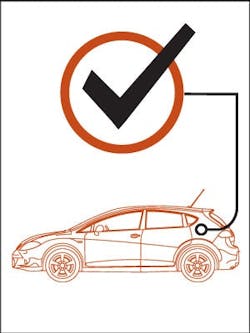Safety Assurance
Safety is the name of the game when it comes to collision repair. Shops not only want to perform quality repairs, but also make sure they’re sending customers home with a safe, roadworthy, and crashworthy vehicle.
For that reason, some shops have found customer service value in becoming certified vehicle safety inspection stations—shops that are state-certified to inspect particular vehicle parts and systems to ensure that everything is working and operating correctly.
Many states actually require drivers to get regular safety inspections, so why not provide your customers the convenience of getting one done while they’re in for a repair? And in states that don’t require inspections, the service still shows customers you’re willing to go the extra mile to ensure their safety, adding to their peace of mind and boosting your credibility. All of that can translate into repeat business for your shop.
The Inspection
Pre-purchase and post-repair type inspections do look at a vehicle’s structural integrity, such as welds, but safety inspections entail many mechanical-related items. Jason Moot, owner of Root’s Collision in Buffalo, N.Y., says collision repair shops should be equipped with the skills and knowledge to perform mechanical repairs in order to fully benefit from becoming an inspection station. Customers don’t have to get necessary repairs done where their vehicle was inspected, but it’s more convenient if they’re able to.
(Click Image For Larger View)
According to a document created by the American Association of Motor Vehicle Administrators in 2003, nearly half of U.S. states mandate occasional vehicle safety inspections.
It’s not a difficult process to get certified as a vehicle safety inspection station, either. It’s a licensing procedure that usually costs less than a couple hundred dollars.
—Jason Moot, owner, Root’s Collision
Both the shop and the individuals who perform the inspections must be licensed through the state. That requires attending a one-day class and passing a final test. Vehicle inspectors must get recertified every two years.
State requirements can vary, though. Check with your state’s Department of Motor Vehicles (DMV) for information specific to your area, and to find out whether regular inspections are mandated in your state. Your DMV should also be able to provide you with information regarding requirements of the inspection itself.
If your state requires regular safety inspections, adding the service to your facility is a convenience to customers already in your shop for a repair.
In New York, for example, drivers are required to have vehicle safety inspections conducted annually. They can be ticketed if there isn’t a current inspection sticker displayed on their window.
So Jason Moot, owner of Root’s Collision in Buffalo, N.Y., decided to get certified as an inspection station to add a convenience factor for customers.
Moot says heavy-hit jobs are often in his shop for up to four weeks. Vehicle owners’ inspection stickers commonly expire during that time. In those cases, Moot offers to conduct the inspection at his facility so the customer doesn’t have to visit yet another shop—knocking out two of their needs at once.
“This makes us a one-stop shop for everything they need,” says Moot, who does about 20 inspections monthly.
Even if drivers in your state aren’t required to obtain vehicle safety inspections, that shouldn’t deter you from getting certified.
George Galowicz, owner of Southwest Collision in Tempe, Ariz., is in such a state—vehicles have no regular safety requirements. But Galowicz offers free 15-point inspections after every repair anyway just to give customers peace of mind they’re driving a safe car.
“We became certified simply because I love safety and quality,” Galowicz says. The service isn’t a big money maker for the shop, but Galowicz says an improved reputation and company image is where he benefits. Spending the extra time to ensure safety leaves a positive perception in customers’ minds.
“It’s all about building a relationship with the customer,” Galowicz says. “Since we’re not required to do this, it shows we’re willing to go above and beyond the call of duty to provide a high level of service.”
Ondrea Babiak, owner of Ted and Sons Body Shop in Folsom, Pa., is certified to conduct safety, post-repair and pre-purchase vehicle inspections.
—George Galowicz, owner, Southwest Collision
He says customers request the service for a variety of reasons, such as concern about the quality of previous repairs, or assurance that they’re operating a safe car. Babiak does free inspections for any customer who asks for it. He says the service has benefitted his customers—and potentially saved a life.
One customer recently moved from California to Pennsylvania, where new vehicles entering the state are required to pass a safety inspection. Babiak looked the car over, and noticed the driver’s seatbelt had been torn and hand-stitched back together.
“They were driving like that for three years, and had no idea it was even a problem,” Babiak says.
Babiak says he regularly sees issues similar to that with customer vehicles. In addition, roughly 75 percent of the vehicles he inspects have poor-quality previous repair jobs.
“It’s very valuable when we can point those things out,” Babiak says. “It’s a great service for our customers.”
